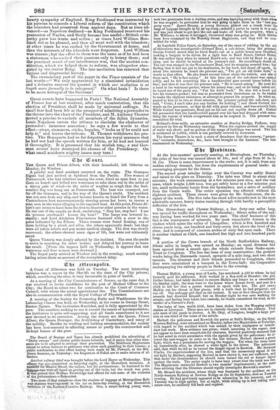Ebe Vrobintes.
At the iron-masters' quarterly meeting, at Birmingham, on Thursday, the price of bar-iron was named about 61. 10s. and of pigs from 31. 5s. to 31. 15s. There is some improvement in the trade; not, it is said, from any sudden railway demand, but from the requirements of general trade: an encouraging prospect for the future.
The second great tubular bridge over the Conway was safely floated and raised to the piers on Thursday. The tube was lifted in about sixty minutes; the work commencing at a few minutes past nine, and the vast mass, which weighs 1,300 tons, was got safely home at a few minutes past ten, amid enthusiastic bursts from the bystanders, and a salvo of artillery from the Castle walls. The entire operation was effected without the slightest accident. Three cheers were given for Mr. Stephenson, the de- signer of the work. The first tube has stood a five-months test in the most admirable manner, heavy trains running through with hardly a perceptible deflection of the iron.
The Shrewsbury and Chester Railway, a line forty-one miles long, was opened for traffic throughout on Wednesday; fifteen miles of the rail- way having been worked for two years past. The chief business of this line is the conveyance of minerals. Its most remarkable feature is the viaduct which spans the valley of Llangollen; which is five hundred and eleven yards long, one hundred and forty-seven feet above the level of the river, and is composed of nineteen arches of sixty feet span each. There is another viaduct at Chirk, one hundred feet high and two hundred yards long.
A portion of the Crewe branch of the North Staffordshire Railway, fifteen miles in length, was opened on Monday; an equal distance had been opened about a month ago- the whole extends from Stoke-upon- Trent to Congleton. The line has been of easy coestruction; the greatest works being the Harecastle tunnel, upwards of a mile long, and two short tunnels. The directors and their friends proceeded to Congleton, where they were entertained at a banquet in the Town-hall; the Corporation accompanying the railway people to Stoke in the evening.
Thomas Malkin, a young man of Leeds, has murdered a girl to whom he had formerly paid his addresses. Both worked in a flax-mill at Hamlet: the girl, Esther Inman, had lately declined to receive Malkin any longer as a sweetheart. On Sunday night, the man went to the house where Inman lived, and sent in a child to tell her that a person wanted to speak with her. The girl came; Malkin cut her throat in four places, with a knife that he had prepared; and ran off. The unhappy girl died on the instant. It was at first thought that the assassin had drowned himself; but on Monday night he was seen walking the streets; and having been taken into custody, he stands committed for trial, on the verdict of a Coroner's Jury. Two bales of lace, worth 3501, have been stolen from the Wapping railway station at Liverpool. Three men are in custody charged with the robbery. They sold most of the goods to dealers. A Mr. Otty, of Longton, bought a large por- tion at one-third of the value of the article.
Herbert the policeman and Berwick the porter at Bull's Bridge, on the Great Western Railway, were reexamined on Monday, before two Magistrates at Uxbridge, with regard to the accident which was caused by their negligence or miscon- duct last week. More evidence was given; which according to the report, does not appear to have been remarkable for clearness. Berwick positively declared that he had acted in strict accordance with the signals given by the policeman: he al- lowed the coal-waggon to come on to the line because Herbert showed a green light, which was a permission for moving the waggon. Yet when the tram came up immediately after, he showed a white light to the driver. The policeman said, that while he did so he turned the danger signal to Berwick. Mr. Seymour Clarke, the superintendent of the line, said that the momentary signal of the red light by Herbert, supposing Herbert to have shown it, was not sufficient, and that under the circumstances he should have turned the red or danger signal against the train. The porter ought to have been aware that the train was due. The Magistrates sentenced Herbert to two months' imprisonment; at the same time advising that the Directors should rigidly investigate Berwick's conduct. Mr. Shnard the architect, whose thigh was fractured by the acadent on the North-western Railway at Newton Bridge on the 2d September, died on Tuesday evening. He had previously appeared to be advancing in his recovery, and on Tuesday was in high spirits; but at night, while sitting up in bed taking seine arrow-root, be suddenly fell back and expired.


























 Previous page
Previous page